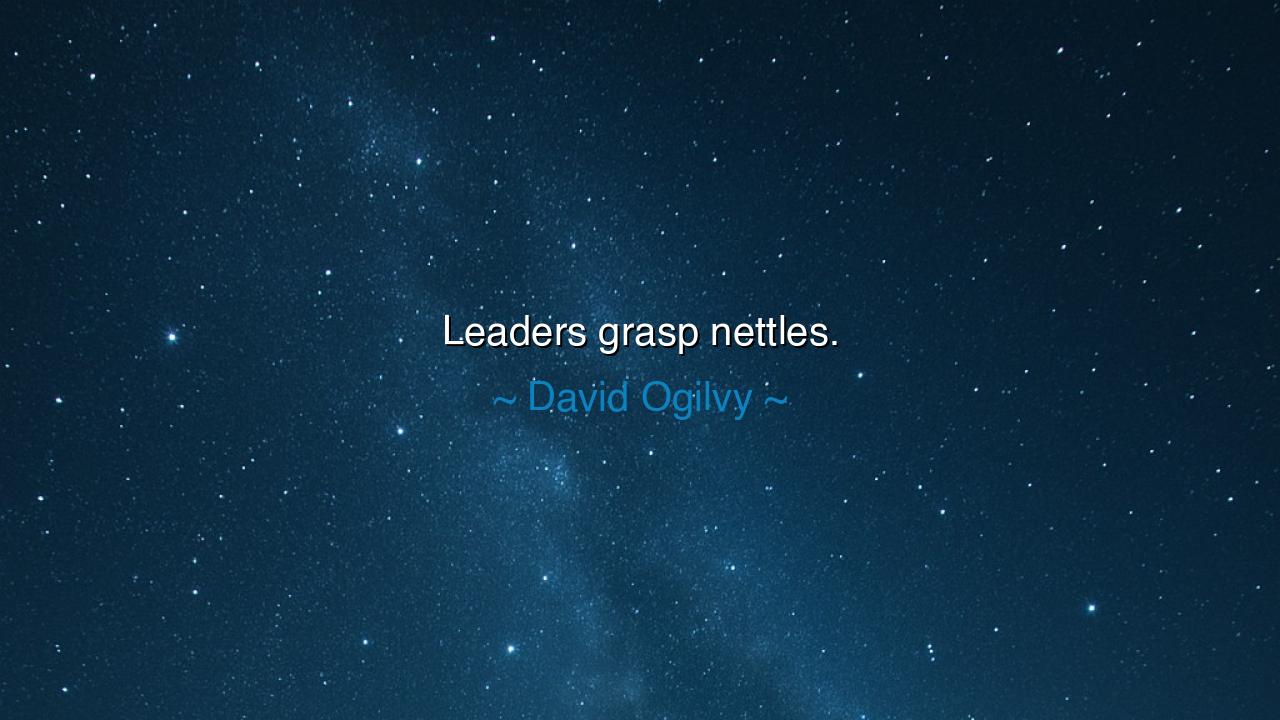
Leaders grasp nettles.






The words of David Ogilvy, “Leaders grasp nettles,” strike like a proverb carved in stone—short, sharp, and filled with truth. The nettle is a plant that stings those who touch it lightly, but it yields when grasped firmly. Thus, in these few words, Ogilvy teaches us that leadership is not the art of avoiding pain, nor the luxury of comfort, but the courage to seize difficult, unpleasant, even dangerous tasks with steady hands. The true leader does not shrink from what others fear; he grasps the nettle, and in doing so, shows his people the way forward.
The ancients themselves knew this lesson. In Roman times, generals who hesitated before hardship lost the faith of their men, while those who seized danger head-on were remembered for centuries. Julius Caesar, when faced with the rebellion of his soldiers, did not bribe them or flatter them—he spoke sternly, took responsibility, and grasped the nettle of discontent until their loyalty was restored. To lead is to face what others avoid, to grasp what others leave untouched, and to transform fear into action.
Ogilvy, master of persuasion and founder of one of the greatest advertising empires, understood that success comes not by dodging the painful truths of business, but by confronting them. When a campaign failed, when clients demanded more, when competition threatened, he did not hide behind excuses. He urged leaders to deal with hard problems directly, to confront mediocrity, to face the sting of reality. For in business, as in life, the nettles will not vanish if ignored—they grow until someone dares to grasp them.
History bears witness to this principle in countless lives. Consider Winston Churchill in Britain’s darkest hour. While others clung to illusions of peace with Hitler, Churchill grasped the nettle of truth: that war was inevitable, and only courage could prevail. His words were not easy, his stance not popular, but by grasping the stinging reality, he rallied his people to endure and ultimately to triumph. Here is the essence of the quote: leaders face the hard thing first.
The meaning of this teaching is both stern and heroic. It tells us that the leader is not the one who enjoys privileges, but the one who embraces responsibilities others flee from. The nettle may sting, the truth may hurt, the task may weary—but by seizing it, the leader shows strength, steadiness, and devotion to a cause greater than themselves. To avoid the nettle is to let it grow wild; to grasp it is to master it.
The lesson for us is plain: in our own lives, we must not run from difficult conversations, unpleasant duties, or painful realities. Whether in family, work, or community, the true test of character is whether we grasp the nettles before us. Do we admit mistakes when it hurts? Do we confront injustice when it is easier to remain silent? Do we take responsibility when blame could be shifted? In each of these moments, leadership is tested.
The practical path is this: begin each day by asking, “What nettle must I grasp today?” Do not delay it, do not soften it—face it directly, firmly, and with courage. Small acts of bravery build the habit of leadership, so that when greater trials come, your hand will already be steady. In this way, the sting of the nettle becomes the crown of the leader.
Therefore, O listener, engrave Ogilvy’s words upon your heart: “Leaders grasp nettles.” Do not fear the sting, for it is the proof of courage. Do not wait for another to act, for the nettle grows sharper with time. Seize it, hold it, and by your example show others that true leadership is not the avoidance of pain but the mastery of it. In this, you will find both respect and victory.






AAdministratorAdministrator
Welcome, honored guests. Please leave a comment, we will respond soon